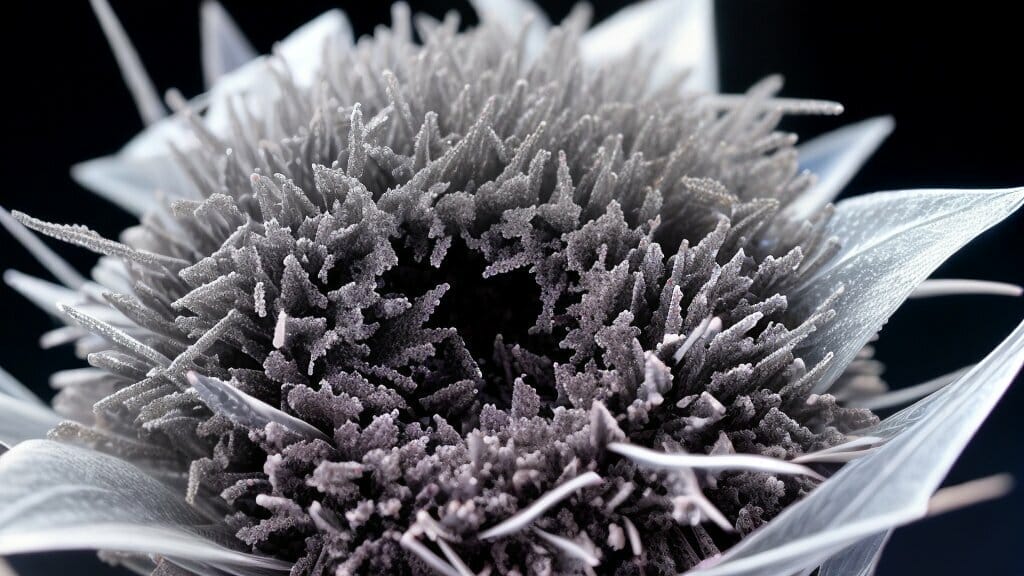Magnesium is an essential mineral that plays a crucial role in various bodily functions, including muscle and nerve function, bone health, and heart rhythm. It is also emerging as a promising supportive treatment for cancer patients. In this section, we will explore the importance of magnesium in cancer care, including its role in treatment and prevention.
Key Takeaways:
- Magnesium is an essential mineral that plays a crucial role in various bodily functions.
- Magnesium deficiency is linked to the development and progression of cancer.
- Magnesium supplementation can offer potential benefits for cancer patients, including enhancing treatment efficacy and reducing side effects.
- A sufficient intake of magnesium through diet and/or supplementation can help reduce the risk of developing certain types of cancer.
The Connection between Magnesium Deficiency and Cancer
Research has shown that magnesium deficiency may be linked to an increased risk of cancer development. Magnesium is an essential mineral that plays a vital role in various bodily functions, including protein synthesis, muscle and nerve function, and blood sugar control. It is also involved in DNA repair and the regulation of cell growth and proliferation.
Studies have found that cancer cells have lower levels of magnesium compared to healthy cells, suggesting a potential connection between magnesium deficiency and cancer development. Magnesium has also been shown to have anti-inflammatory and antioxidant properties, which may help protect against cellular damage that can lead to cancer.
Furthermore, magnesium deficiency may contribute to the growth and progression of cancer cells. In vitro studies have demonstrated that magnesium deficiency can enhance tumor cell proliferation and metastasis, while magnesium supplementation can inhibit these processes.
Therefore, maintaining optimal magnesium levels may be crucial for cancer prevention and treatment. It is important to note, however, that excessive magnesium intake may also have negative implications for cancer patients, highlighting the need for balanced magnesium levels in the body.
Magnesium’s Role in Cancer Treatment
Magnesium can play a crucial role in supporting cancer treatment. Cancer patients often experience a variety of physical and emotional side effects from treatments such as chemotherapy and radiation therapy. Magnesium supplementation may provide relief from some of these symptoms, as well as improve overall well-being during cancer treatment.
Research has shown that magnesium can enhance the efficacy of chemotherapy and radiation therapy, potentially leading to better treatment outcomes for cancer patients. In addition, magnesium supplementation has been found to reduce treatment-related side effects such as nausea, vomiting, and fatigue.
Furthermore, magnesium can play a role in reducing inflammation and oxidative stress in the body, both of which are implicated in cancer development and progression. By addressing these underlying factors, magnesium may help prevent cancer cells from proliferating and support the healing process in cancer patients.
However, it is important to consult with a healthcare professional before starting magnesium supplementation, especially if undergoing cancer treatment. Magnesium may interact with certain medications or have adverse effects in higher doses. Therefore, appropriate dosages and timing of magnesium supplementation should be carefully considered on an individual basis.
Magnesium supplementation may provide relief from some cancer treatment-related symptoms, as well as improve overall well-being during cancer treatment.
The Importance of Magnesium in Cancer Prevention
Magnesium plays a crucial role in cancer prevention by reducing the risk of developing certain types of cancer. Studies have shown that magnesium intake is inversely associated with the risk of colorectal cancer, and that magnesium levels in the body may affect the development of breast, ovarian, and pancreatic cancer.
It is recommended that adults consume between 320-420 mg of magnesium per day to help reduce the risk of developing cancer and promote overall health. Fortunately, there are many dietary sources of magnesium that cancer patients can incorporate into their daily diet, including:
| Food Source | Magnesium Content (mg/serving) |
|---|---|
| Spinach, boiled | 157 |
| Almonds, dry roasted | 80 |
| Avocado, cubed | 44 |
| Brown rice, cooked | 42 |
| Black beans, cooked | 120 |
In addition to dietary sources, magnesium supplementation may also be necessary for cancer patients who are deficient in this vital mineral. However, it is important to consult with a healthcare professional before starting a magnesium supplementation regimen, as excessive magnesium intake can have negative side effects and interact with certain medications.
By ensuring adequate magnesium intake through diet and/or supplementation, cancer patients can help reduce their risk of developing cancer and improve their overall health and well-being.
Magnesium and Holistic Cancer Care
In addition to conventional cancer treatments, holistic approaches that incorporate complementary therapies have gained recognition in recent years. The Cancer Center for Healing in Irvine, CA is one such facility that offers holistic cancer care alongside conventional medicine.
Under the guidance of Dr. Leigh Erin Connealy MD, medical director at the center, patients can receive a comprehensive treatment plan that includes a range of holistic therapies tailored to their individual needs. These may include nutritional counseling, acupuncture, massage therapy, and more.
At the Cancer Center for Healing, magnesium is recognized as an important component of holistic cancer care. By integrating magnesium supplementation and promoting adequate dietary intake, patients can benefit from the potential cancer-fighting properties of this essential mineral.
Patients interested in exploring holistic cancer care can book a consultation at the Cancer Center for Healing to discuss their options and receive personalized treatment recommendations.
Magnesium Supplementation in Cancer Care
Magnesium supplementation can be a helpful addition to cancer care, especially for those who may be deficient in this essential mineral. It can help address magnesium deficiency, which is common in cancer patients and can contribute to treatment-related side effects and a weakened immune system.
Research has shown that magnesium supplementation may also enhance the efficacy of chemotherapy and radiation therapy, potentially improving treatment outcomes. Additionally, magnesium has been found to be beneficial in reducing treatment-related side effects, such as nausea and vomiting, and improving overall well-being during cancer treatment.
It is important to consult with a healthcare professional before starting magnesium supplementation, as appropriate dosages may vary depending on the individual and any other medications they may be taking. It is also worth noting that excessive magnesium intake can have negative implications for cancer patients, so it is crucial to maintain balanced magnesium levels through a combination of diet and supplementation.
Overall, magnesium supplementation can be a valuable tool in supporting cancer care and improving quality of life for cancer patients. When used in conjunction with other conventional and holistic treatments, it can help enhance treatment outcomes and promote overall health and well-being.
Magnesium-Rich Foods for Cancer Patients
When it comes to maintaining optimal magnesium levels in the body, diet plays a crucial role. For cancer patients, ensuring that they consume foods rich in magnesium can help support the body’s natural functions and reduce the risk of deficiencies that can exacerbate cancer-related symptoms. Some of the best dietary sources of magnesium include:
- Dark leafy greens: Spinach, kale, and Swiss chard are all excellent sources of magnesium.
- Nuts and seeds: Almonds, pumpkin seeds, and cashews are all rich in magnesium.
- Fruits: Bananas, figs, and avocado are all good sources of magnesium.
- Whole grains: Brown rice, quinoa, and whole-wheat bread are all high in magnesium.
- Seafood: Salmon and mackerel are both good sources of magnesium.
Incorporating these foods into a balanced diet can help cancer patients maintain optimal magnesium levels and support overall health and well-being.
Balancing Magnesium Levels in Cancer Care
While magnesium is an essential mineral for overall health, it’s important to maintain balanced levels during cancer care. Both a deficiency and excess of magnesium can have negative implications for cancer patients.
Factors that can affect magnesium levels in the body include diet, medication use, and underlying medical conditions. Cancer patients may also have increased magnesium loss due to treatments such as chemotherapy or radiation therapy.
It’s important to work with a healthcare professional to monitor magnesium levels and ensure they stay within a healthy range. This may involve adjusting diet or supplementation as necessary.
Remember, magnesium is just one aspect of a comprehensive cancer care plan. While it can offer potential benefits, it should be considered in conjunction with other treatments and therapies as part of an individualized approach to cancer care.
Potential Side Effects and Precautions of Magnesium Use in Cancer Care
Although magnesium supplementation can offer potential benefits for cancer patients, it is important to be aware of potential side effects and take necessary precautions.
One potential side effect of magnesium supplementation is digestive upset, including diarrhea and nausea. It is important to start with a low dose and gradually increase as tolerated to minimize these side effects. Additionally, it is important to speak with a healthcare professional before starting magnesium supplementation, especially if currently taking medications or have pre-existing health conditions.
| Risk Factors for Magnesium Supplementation | Precautions |
|---|---|
| Renal impairment | Avoid high doses of magnesium supplementation |
| Heart disease | Speak to a healthcare professional before starting supplementation |
| Diabetes | Monitor blood glucose levels carefully while taking magnesium supplements |
It is also important to carefully monitor magnesium levels when taking supplements, as excessive magnesium intake can also have negative implications for cancer patients. High levels of magnesium in the body can lead to toxicity symptoms such as lethargy, confusion, and irregular heartbeat.
Overall, it is important to speak to a healthcare professional and carefully monitor magnesium supplementation to ensure safe and effective use in cancer care.
Research and Evidence on Magnesium in Cancer Care
Several studies have shown the potential benefits of magnesium in cancer care. One study published in the Journal of the American College of Nutrition found that magnesium intake may help reduce the risk of colon cancer in women. Another study published in the European Journal of Clinical Nutrition found that magnesium supplementation may reduce the risk of pancreatic cancer in men.
In addition, a study published in the journal Biological Trace Element Research found that magnesium supplementation can enhance the efficacy of chemotherapy in breast cancer patients, reducing treatment-related side effects and improving overall quality of life. Another study published in the Journal of Alternative and Complementary Medicine found that magnesium can enhance the effects of radiation therapy, helping to shrink tumors and reduce treatment-related side effects in prostate cancer patients.
While more research is needed to fully understand the role of magnesium in cancer care, these studies suggest that magnesium may offer significant benefits to cancer patients. From reducing cancer risk to enhancing treatment outcomes and improving overall well-being, magnesium supplementation can be an important part of a comprehensive cancer care plan.
Magnesium as a Complementary Approach to Conventional Cancer Treatment
Magnesium can play a significant role in enhancing the effectiveness of conventional cancer treatments. Its ability to reduce treatment-related side effects and improve overall well-being during cancer treatment makes it a valuable addition to any cancer care regimen.
Research indicates that magnesium can also enhance the effectiveness of chemotherapy and radiation therapy, potentially leading to improved treatment outcomes. By supporting healthy cell function and minimizing treatment-related damage to healthy tissues, magnesium can help to maximize the benefits of conventional cancer treatments.
Additionally, integrating magnesium as a supportive therapy can help to address magnesium deficiency in cancer patients, improving overall health and reducing the risk of cancer progression and recurrence.
However, it is important to note that magnesium should only be used as a complementary approach to conventional cancer treatment. Patients should always consult with a healthcare professional before starting magnesium supplementation or any other supportive therapies.
Overall, the integration of magnesium as a complementary approach to conventional cancer treatment can offer significant benefits for cancer patients. By supporting healthy cell function, reducing treatment-related side effects, and improving overall well-being, magnesium can help to maximize the benefits of conventional cancer treatments and support optimal cancer care.
Magnesium and Holistic Cancer Care
Integrating holistic treatments alongside conventional medicine can provide a more comprehensive approach to cancer care. The Cancer Center for Healing in Irvine, CA, is one such center that offers a range of holistic treatments for cancer patients. Led by medical director Dr. Leigh Erin Connealy, MD, the center’s holistic cancer treatment program includes a focus on nutrition, detoxification, and mind-body therapies to support overall well-being.
One of the key components of the center’s holistic approach is the use of magnesium supplementation. Magnesium is an essential mineral that can support cancer treatment and prevention, as well as overall health. The center recognizes the importance of monitoring and balancing magnesium levels in patients, and offers guidance on how to achieve optimal levels through diet and/or supplementation.
The center’s comprehensive approach to cancer care, which includes the integration of magnesium and other supportive therapies, can help improve treatment outcomes and overall quality of life for cancer patients.
Conclusion
Magnesium plays a crucial role in cancer care, with its benefits extending to both prevention and treatment. This vital mineral can help reduce the risk of cancer development and enhance the efficacy of conventional cancer treatments such as chemotherapy and radiation therapy.
Magnesium supplementation can help address magnesium deficiency in cancer patients, with potential benefits that include reducing treatment-related side effects and improving overall well-being during cancer treatment.
However, it is important to maintain balanced magnesium levels, as both deficiency and excess can have negative implications for cancer patients. It is crucial to consult with a healthcare professional before starting magnesium supplementation.
The Cancer Center for Healing in Irvine, CA, offers a holistic cancer care approach that emphasizes the integration of conventional cancer treatments with complementary therapies, such as magnesium supplementation and other holistic treatments. Book a consultation to learn more about their holistic cancer treatment program and how it can benefit you or your loved ones.
Overall, the existing research and evidence support the role of magnesium in cancer care, making it a valuable addition to any cancer treatment plan. By maintaining optimal magnesium levels through diet and supplementation and integrating holistic approaches, cancer patients can improve their treatment outcomes and overall well-being.
FAQ
Q: What is the role of magnesium in cancer care?
A: Magnesium plays a crucial role in cancer care, both in treatment and prevention. It enhances the efficacy of chemotherapy and radiation therapy, reduces treatment-related side effects, and improves overall well-being during cancer treatment. Additionally, maintaining optimal magnesium levels can help reduce the risk of developing certain types of cancer.
Q: How does magnesium deficiency contribute to cancer?
A: Insufficient levels of magnesium can contribute to the growth and progression of cancer cells. It is important to maintain balanced magnesium levels for overall health and to prevent the development of cancer.
Q: What are the benefits of magnesium supplementation for cancer patients?
A: Magnesium supplementation can help address magnesium deficiency in cancer patients. It may improve treatment outcomes, reduce side effects, and support overall well-being during cancer care.
Q: How can magnesium prevent cancer?
A: A sufficient intake of magnesium through diet and/or supplementation can help reduce the risk of developing certain types of cancer. It is important to maintain balanced magnesium levels for cancer prevention.
Q: How is magnesium integrated into holistic cancer care?
A: At the Cancer Center for Healing in Irvine, CA, holistic treatments are offered alongside conventional medicine. Magnesium is an integral part of their holistic cancer treatment program, which aims to enhance treatment outcomes and overall well-being. To book a consultation, contact Dr. Leigh Erin Connealy MD, the medical director, at the Cancer Center for Healing.
Q: Is magnesium supplementation recommended in cancer care?
A: Magnesium supplementation can be beneficial for cancer patients to address magnesium deficiency. However, it is important to consult with a healthcare professional before starting supplementation to determine the appropriate dosage and address any potential interactions with other medications.
Q: What are some dietary sources of magnesium for cancer patients?
A: Magnesium-rich foods such as leafy greens, nuts, seeds, whole grains, and legumes can be beneficial for cancer patients. These foods can help support overall health during cancer treatment and reduce the risk of developing certain types of cancer.
Q: Why is balancing magnesium levels important in cancer care?
A: Both deficiency and excess of magnesium can have negative implications for cancer patients. Maintaining balanced magnesium levels is essential for optimal cancer care and overall health.
Q: Are there any side effects or precautions associated with magnesium use in cancer care?
A: While magnesium supplementation can be beneficial for cancer patients, there may be potential side effects and precautions to consider. It is important to consult with a healthcare professional before starting magnesium supplementation to ensure appropriate dosages and address any potential interactions with other medications.
Q: What is the research and evidence supporting the role of magnesium in cancer care?
A: There is existing research and evidence that supports the role of magnesium in cancer care. Studies and findings demonstrate the potential benefits of magnesium for cancer patients, including its effect on treatment outcomes and overall well-being.
Q: How does magnesium complement conventional cancer treatment?
A: Magnesium is a complementary therapy to conventional cancer treatments. Integrating magnesium into cancer care can enhance treatment outcomes and overall well-being, providing a synergistic effect alongside conventional treatments.
Q: What holistic treatments are available at the Cancer Center for Healing?
A: The Cancer Center for Healing in Irvine, CA offers various holistic treatments for cancer patients. These treatments aim to support overall well-being and enhance treatment outcomes. To learn more, contact Dr. Leigh Erin Connealy MD, the medical director, at the Cancer Center for Healing.














